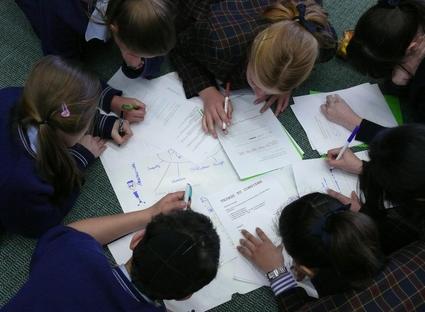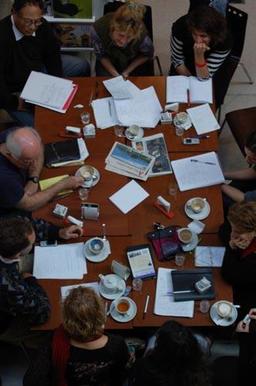Things Your Writing Teacher Never Told You: Peer-Pressure Writing: Offering Encouragement & Just a Little Shame
 Mama may have warned you as a child not to give into peer pressure, but that all depends on what the chanting crowd is pushing you to do. In more and more cases, in a variety of ways, writers are inviting other writers to pressure them to write, right? These can include formal educational writers’ retreats, but can be as simple as you and a buddy meeting at a coffee shop.
Mama may have warned you as a child not to give into peer pressure, but that all depends on what the chanting crowd is pushing you to do. In more and more cases, in a variety of ways, writers are inviting other writers to pressure them to write, right? These can include formal educational writers’ retreats, but can be as simple as you and a buddy meeting at a coffee shop.
The classic model is to attend a writers’ retreat. There are lots of them with varied focuses on writing form, commercial genre, regional location, school affiliation, and more. Often, these retreats also offer work-shopping of the manuscripts written there, and in some cases, guest lectures by top tier authors and editors.
One of the best in the spec lit field is the Clarion Science Fiction and Fantasy Writers’ Workshop. A six-week program held on a college campus, it was established in 1968 and has a stiff competition among applicants to be accepted. It has other regional offshoots. As you can imagine, paying room, board, and instructors fees can add up: the 2015 Clarion workshop was estimated to cost around $5,000, plus travel, and that’s in addition to being able to afford six weeks away from your job.
The other major player in genre-oriented workshops is The Odyssey Writing Workshops, which offers a six-week workshop for Horror, Science Fiction and Fantasy. But they’re more a year-round, full-service sort of place with online classes; professional-level critiques, writer consultation services with Odyssey director Jeanne Cavellos, an online salon, blog, newsletter, writer’s tips, and more.
 Those are excellent programs, and I’m always in favor of learning, but what you may need right now is simple reinforcement to sit and write. You can always arrange an informal writers retreat with just you and a buddy or two. You can rent or borrow a lake house, a cabin in the woods, a condo on the ocean, or hang out at a bed and breakfast. You still have the cost of travel, lodging, and food, but it’s significantly cheaper than a formal workshop. I’ve done all of these with great success. Like me, if staring at nature helps get your creative juices flowing, try it out. A writing vacation can be a wonderful thing, if you go with other writers or a spouse who takes great joy in reading a book while you write to your heart’s content.
Those are excellent programs, and I’m always in favor of learning, but what you may need right now is simple reinforcement to sit and write. You can always arrange an informal writers retreat with just you and a buddy or two. You can rent or borrow a lake house, a cabin in the woods, a condo on the ocean, or hang out at a bed and breakfast. You still have the cost of travel, lodging, and food, but it’s significantly cheaper than a formal workshop. I’ve done all of these with great success. Like me, if staring at nature helps get your creative juices flowing, try it out. A writing vacation can be a wonderful thing, if you go with other writers or a spouse who takes great joy in reading a book while you write to your heart’s content.
But hopefully, you’re trying to write at least a bit several times a week, if not every day. Retreats are a great way to jumpstart a lull in your writing, but maybe you need more basic and frequent help than that.
There’s no shame in needing some extra reinforcement to write, and there are some no-cost ways to do it. There are many online communities on Facebook and other sites where members of the group are encouraged to post their daily word counts and ask and comment on problems or process. Many of them are based on a minimum word count challenge.
For several years, the group that came to be known as the Summer Writers Club challenged its members to write two pages a day, 500 words, seven days a week, every day of summer, with the goal of completing 50,000 words by summer’s end. It was started by Columbia College Chicago professor Sam Weller, and was open to all students, alumni, faculty, and any and all of their writer friends. When it left Facebook to go to another site, it had about 300 members from all across the U.S. and several other countries, besides. While it was primarily designed for folks who had a glorious summer free to write, the goal, two pages a day, was still very achievable for folks who worked a regular day job.
 The subtle message and purpose behind the group and groups like it is that two pages a day really isn’t that much. It isn’t that hard. Even when Life happens, if you stay in practice, you can crank out, or at least churn out, those two pages. It didn’t matter if they were rough. Or if they were crap. The goal was to keep the habit going.
The subtle message and purpose behind the group and groups like it is that two pages a day really isn’t that much. It isn’t that hard. Even when Life happens, if you stay in practice, you can crank out, or at least churn out, those two pages. It didn’t matter if they were rough. Or if they were crap. The goal was to keep the habit going.
I participated in it for the several summers when it was run through a Facebook page. I give it great credit in helping me in the early months of those summers to keep writing. But I only wrote five days a week, because I’d found trying to write 7 days a week didn’t work for me for various reasons. So, I was already in the hole 1,000 words, each week, that had to be made up. And, each summer, a couple weeks would come along where I was traveling or had health problems or had a family crisis, and I’d invariably fall behind.
The group was a no-shame group. No one was chiding anyone for not making the daily goal, but I, and some of the other members I talked to, had the same problem: we couldn’t give up the guilt. With the “50,000 words by the end of summer!” mantra, we couldn’t get our subconscious to wipe the daily slate clean. So rather than starting a writing session with, “Two pages is easy, I can do that, no problem!” we were instead starting our session with the internal message, “I’m X,000 words behind, and my weekend is coming up. So if I write five pages today and six pages tomorrow, I’ll almost be caught up on the overall tally, and…”
 For some folks, even five or six pages a day is no big deal. The big problem was not how many pages we could manage to write in a day, but that we kept tallies of how far behind we were in the goal, of how many words we had to make up, and quick! What had started out as joyous reinforcement became a sense of shame. I was burdened by the feeling that I was failing and would never be able to catch up. Each summer, by August, I had quietly dropped out of the group.
For some folks, even five or six pages a day is no big deal. The big problem was not how many pages we could manage to write in a day, but that we kept tallies of how far behind we were in the goal, of how many words we had to make up, and quick! What had started out as joyous reinforcement became a sense of shame. I was burdened by the feeling that I was failing and would never be able to catch up. Each summer, by August, I had quietly dropped out of the group.
Some of the folks decided we ought to be encouraging each other to write all year, no matter the season, and no matter the word count, and no matter how many days a week you wrote. The much more laid back Winter Writers Group was born, thanks to Columbia College Chicago professor Patricia Ann McNair. It is still active in a low-key way on Facebook today, with more than 300 members. While you have to “knock” to get in the group, as long as you’re a human who wants to write, they’ll let you in. The name was inspired by the Summer group, but is better explained by the Sinclair Lewis quotation that is in the group’s masthead, “Winter is not a season, it’s an occupation.” In other words, Write all year long.
While I sometimes post to the group, there often isn’t daily activity there that is showing up in my newsfeed as a subtle push to get my day’s words done and report in. “Out of sight,” and all that.
This summer, wanting to get a LOT of writing done, and knowing that because: reasons, there were significant hurdles that I’d need help jumping, I went looking for another answer and found an old technique waiting for me, and in the waiting, it had gotten spiffed up.
I’ve always called it peer pressure writing, and before that, peer pressure studying, going back to my junior high days. You gather folks in a place together — whether that’s a kitchen, a big table at a library, or on blankets in the park — and everyone pledges to work quietly (or at least stay quiet) for a certain amount of time. There would be intervals for chat and refreshments, and then another work period, all done to a set schedule. When I was coordinating, it was usually an hour of work, 15 minutes of break, an hour of work, 15 minutes of break, then survey the group to see if anyone wanted a third round. The key to this working is actually enforcing the rules.
Back when folks were often writing by hand or working with books, we’d put a watch or a timer in the center of the group. The restless could pick it up and see how much time was left, but that person was studiously avoided in case they tried to make eye contact and start talking before work time was up. Now smart phones with alarms are a redundancy that can be used, even if everyone is checking the clock in the bottom right corner of their computer screen.
 This summer, I’ve done several of these a week, often doing a separate 2-3 hour writing block either before or after my scheduled one. Sometimes it was with one friend. And sometimes it was at a Just Write Chicago meetup.
This summer, I’ve done several of these a week, often doing a separate 2-3 hour writing block either before or after my scheduled one. Sometimes it was with one friend. And sometimes it was at a Just Write Chicago meetup.
The group formed in January 2010 with 50 members and just 1 meeting a week. It’s organized, then as now, through Meetup.com, who charges a group about $70 a year to host for the group info pages, a message board, and send out event reminders by email, with an RSVP function built in. Though the original founder is no longer involved, the org continues to thrive and grow under a team of four main volunteers. Just shy of 2,000 folks have subscribed to their Meetup page, and there are roughly six semi-permanent meetups a week at coffee shops across various neighborhoods in Chicago (trying to serve north, south, east, and west neighborhoods). Most of the semi-permanent groups meet at the same time and place each week. Depending on the meeting, you write for 90 minutes or two hours, then join a group chat, nominally led by the Just Write coordinator for that group.
As their Meetup page says, “This is a group that meets to WRITE, to socialize, and to offer encouragement and inspiration to others as we practice our craft. We’re focused on the process, not the product. Writing can be a solitary activity…but it doesn’t have to be.”
It doesn’t matter what type of writing you do, what skill level you’re at, or or how old you are. Some folks only attend one meeting a week. Others hit two, or even three. Though it is unplanned, and certainly not enforced, the Tuesday and Thursday meetups, both in north side neighborhoods, have a fair number of genre writers who attend.
 Jennifer Cross, the lead organizer of Just Write Chicago, runs the Tuesday night event at the Coffee Studio in Andersonville, which starts at 6:30. She says, “Just Write is Chicago’s largest writing group dedicated to providing a safe, inclusive, and motivational space for writers of all genres and all levels time to ‘just write’.”
Jennifer Cross, the lead organizer of Just Write Chicago, runs the Tuesday night event at the Coffee Studio in Andersonville, which starts at 6:30. She says, “Just Write is Chicago’s largest writing group dedicated to providing a safe, inclusive, and motivational space for writers of all genres and all levels time to ‘just write’.”
Folks in the feminist genre community may recognize her name. She describes herself as, “…an unapologetic black queer feminist nerd [who speaks] at conventions like C2E2 or WisCon about diversity, inclusion, and representation within SF/F.”
The Thursday group starts at 6 pm at The Chicago Grind, near the boundary of Edgewater and Uptown. Conversation begins at 8 pm. It’s run by Josh McMullen, who is hard at work on a meta sf trilogy. During discussion last Thursday, he explained to two folks who were attending their first Just Write session and who had both just recently moved to Chicago, “A lot of people join Just Write because they’re new in town, and they’d like to meet some people, especially other writers.”
It’s true that one of the benefits of being a writer is that you can work without ever getting out of your pajamas. But one of the drawbacks is that most writers don’t have the proverbial water cooler to gather ’round for a face to face chat. Peer pressure writing, however it’s organized, provides both motivation to write and a chance to socialize with folks who “get” what you do.
If you found this article helpful, you might also enjoy my previous blogs:
Seven Common Approaches to Stories That Use Mythology, Fairy Tales & Other Established Source Material
No TV for You (when it comes to publicizing your book)
Peer-Pressure Writing: Offering Encouragement & Just a Little Shame
A Story Analysis Worksheet
Tricks for Writing in Public
Location, Location, Location! or How to Find and Maintain Your Writing Space
What Should You Put In a Cover Letter?
Ignore the Market Guidelines at Your Peril – How (Not) to Build a Career
Tina L. Jens has been teaching varying combinations of Exploring Fantasy Genre Writing, Fantasy Writing Workshop, and Advanced Fantasy Writing Workshop at Columbia College-Chicago since 2007. The first of her 75 or so published fantasy and horror short stories was released in 1994. She has had dozens of newspaper articles published, a few poems, a comic, and had a short comedic play produced in Alabama and another chosen for a table reading by Dandelion Theatre in Chicago. Her novel, The Blues Ain’t Nothin’: Tales of the Lonesome Blues Pub, won Best Novel from the National Federation of Press Women, and was a final nominee for Best First Novel for the Bram Stoker and International Horror Guild awards.
She was the senior producer of a weekly fiction reading series, Twilight Tales, for 15 years, and was the editor/publisher of the Twilight Tales small press, overseeing 26 anthologies and collections. She co-chaired a World Fantasy Convention, a World Horror Convention, and served for two years as the Chairman of the Board for the Horror Writers Assoc. Along with teaching, writing, and blogging, she also supervises a revolving crew of interns who help her run the monthly, multi-genre, reading series Gumbo Fiction Salon in Chicago. You can find more of her musings on writing, social justice, politics, and feminism on Facebook @ Tina Jens. Be sure to drop her a PM and tell her you saw her Black Gate blog.